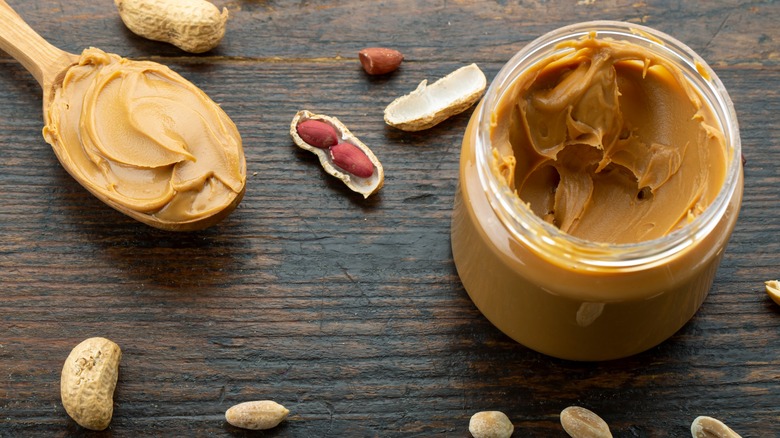Avoid Eating Salted Peanut Butter If You Have These Medical Conditions
People with heart health-related medical conditions may want to be mindful of what kind of peanut butter they buy. On the one hand, peanut butter can greatly benefit our cardiovascular health. In a 2017 study published in the Journal of the American College of Cardiology, researchers looked at how eating different types of nuts affected the heart health of thousands of men and women over a decades-long follow-up period. Along with peanuts, tree nuts, and walnuts, peanut butter was also included in the study. A diet rich in nuts overall was found to be associated with a reduced risk for cardiovascular disease and coronary heart disease. Weekly consumption of peanuts — along with tree nuts and walnuts — was specifically found to lower cardiovascular disease risk by anywhere between 13% and 19%, and to reduce coronary heart disease risk by 15% to 23%.
However, the nutritional value of peanut butter can vary between products. For those with heart disease, salted peanut butter may be best avoided due to its sodium content. Let's take a closer look at the relationship between sodium intake and heart disease.
Avoid salted peanut butter if you have heart disease
Sodium is most often consumed in the form of salt, and according to the U.S. Centers for Disease Control and Prevention (CDC), most people in the U.S. are getting an excess of sodium in their diets — often through foods that have more sodium than you might think. Although the body needs the mineral to function, overconsumption of sodium can increase one's susceptibility to stroke or heart disease. While experts recommend getting less than 2,300 milligrams (mg) of sodium daily, many Americans are consuming upwards of 3,400 mg each day.
But is there really that much of a difference in sodium content between salted and unsalted peanut butter? According to the U.S. Department of Agriculture (USDA), a 2-tablespoon serving of smooth peanut butter with no added salt contains 5.44 mg of sodium. In comparison, the same-sized serving of smooth salted peanut butter has 136 mg of sodium (via USDA).
Avoid salted peanut butter if you have high blood pressure too
People with heart disease aren't the only individuals who may want to avoid eating salted peanut butter; those with high blood pressure may want to do the same. Medically termed hypertension, only approximately 25% of people with high blood pressure are successfully managing the condition, reports the U.S. Food and Drug Administration (FDA). As a risk factor for stroke, heart failure, and heart disease, hypertension reportedly factored into 600,000 deaths across the country in 2021. When it comes to sodium intake, getting too much of the mineral can cause blood pressure levels to rise, which is why maintaining a low-sodium diet is recommended for those with hypertension (via CDC).
For these reasons, people with heart disease or hypertension are encouraged to choose peanut butter products labeled as low-sodium or those void of sodium altogether. As we said, 2 tablespoons of smooth peanut butter with no salt added has 5.44 mg of sodium, but the same size serving of salt-free almond butter may do you one better. In 2 tablespoons of plain almond butter with no salt added you'll find just 2.24 mg of sodium (via USDA).



